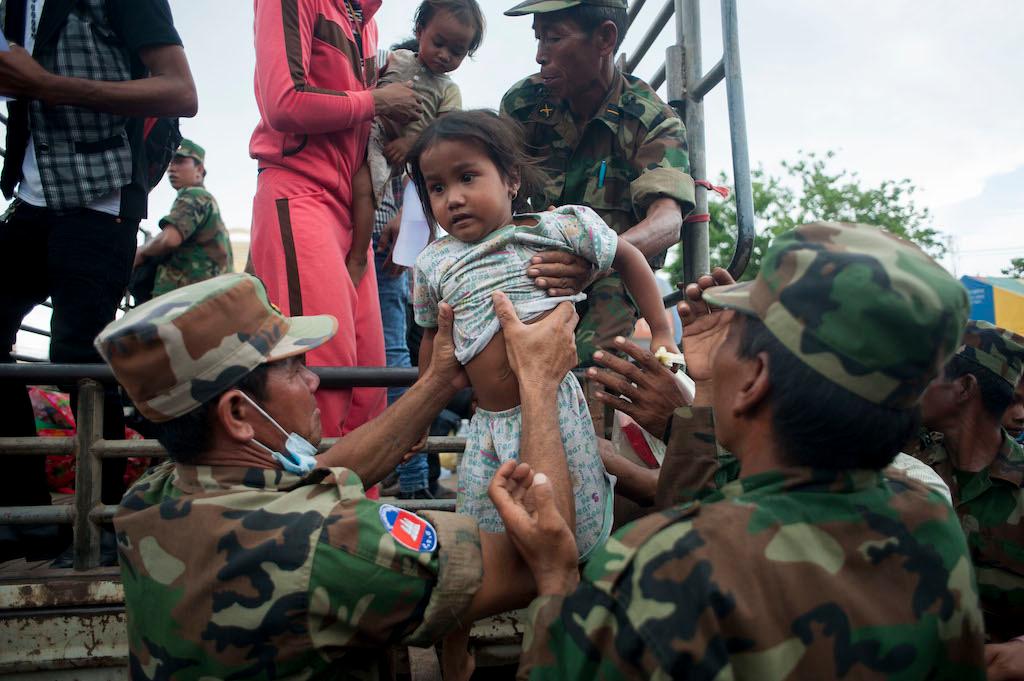Cambodian workers accuse Thai junta of arrest and abuse
POIPET, Cambodia — They are brought to the border by the truckload, with buses, freight cars and cage-like military vehicles all packed so tightly no one can sit or move. The migrant workers are unloaded in a chaotic swell of human cargo, ushered onto the border with their children and rice sack of belongings in tow.
Safe at last.
“Thailand was like holding my breath, but now I can breathe again,” said 29-year-old Mai shortly after he crossed into Cambodia.
Even though he is effectively stranded, jobless, homeless and penniless, Mai said he is “happy to be in Cambodia and with Cambodians again” following a turbulent month as a cassava farmer in Thailand.
More than 200,000 Cambodians have fled Thailand over the last two weeks in an abrupt exodus triggered by fears of a military-led crackdown on undocumented workers.
As many as three million foreign laborers, mainly from neighboring Cambodia, Burma and Laos, eke out a living in Thailand’s textile, fishing, agriculture and construction sectors, or by filling other menial jobs that supply the backbone of the unskilled workforce.
Estimates of undocumented Cambodian workers in Thailand run near 400,000.
Confusion reigns over the status of these foreigners.
Following an initial announcement last week that “illegal workers” would face arrest and deportation, Thailand’s military government — which seized power in a coup on May 22 — has retracted the stance, and adamantly denies any official policy to evict migrant workers. The junta has since started urging migrant workers to stay, and publicly announced that those who left should come back legally.
The army also rejected accusations of abusive treatment towards migrants as “groundless,” and claimed that workers were returning home to plant rice crops.
But Cambodians discarded from the country to sleep on muddied cardboard across the border tell a different story.
“When Thai officials see anyone who looks Cambodian they ask them to speak Thai. If they can’t, they’re brought into the police office,” said Tim Bunthoeun, a 29-year-old iron factory worker.
“If [the worker] is legally in Thailand the employer who keeps the passports can come get them from the jail, but if they aren’t [legal], then no one will come. The employer doesn’t want to be fined,” he said.
Bunthoeun claimed he had been legally employed in Thailand. He said police came twice within the last month to “check” his factory for undocumented workers. Last week, officials arrested half a dozen migrants. They demanded 400 Baht ($13) each to get out of jail.
“When I saw the situation was getting worse, I decided I should get out while I still had a chance to reach a safer place,” he said.
Just to get to Cambodia, many migrants said the army extorted them for money to guarantee safe passage. Some workers reported being arrested, detained and eventually deported while already on their way to leave the country.
“The soldiers found us at the bus station and took us to an army base. Over a 1,000 people were pushed under a single roof. They told us we needed to pay 500 Baht ($16) each to leave. If we didn’t have the money, they told us we would have to wait longer,” said Chheat Pin, a 40-year-old construction worker who said he came to Thailand to feed his family after a development project seized his small plot of farmland in Cambodia.
“[At the base] they didn’t give us food or water. If you had money, you could buy it from them, but if not, you went hungry,” he said.
Migration expert Andy Hall said arrests and crackdowns are an everyday occurrence for workers here. What’s extraordinary, he said, is the extent of the exodus. “It doesn't just happen easily that hundreds of thousands [of migrants] move to the border,” Hall noted.
The panic driving migrants home affects almost entirely Cambodians, which may be the result of strained political relations. Thailand’s larger community of Burmese workers remains essentially unfazed.
Though Thai-Cambodian relations have long been tense, the border between them had remained largely porous until the military takeover. “It is a political decision,” said Thai academic Pavin Chachavalpongpun, owing to “the historical wound in Thai-Cambodian relations.”
“Perhaps this is to retaliate [against] Cambodia for hosting so many Thai exiles at the moment,” Pavin added.
But for now at least, even without the security of jobs or knowing how to get their next meal, most returned migrants said the reassurance of having made it home is enough.
“I will find a place to sleep. I will earn money. But I cannot be arrested or shot, or who will feed my son?” said Keo Soeun, a 31-year migrant worker.
Our coverage reaches millions each week, but only a small fraction of listeners contribute to sustain our program. We still need 224 more people to donate $100 or $10/monthly to unlock our $67,000 match. Will you help us get there today?
